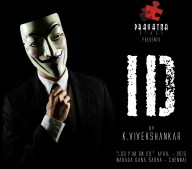R.S. MANOHAR – LEGENDARY ACTOR
RANDOR GUY.
The quintessential villain of Tamil cinema, R. S. Manohar’s contribution to theatre was phenomenal.
Manohar’s plays based on mythology were huge hits and he produced them sparing no expense.
It is a day in the mid-1950s and it is the home-office of noted lawyer, playwright, and theatre person, V. C. Gopalratnam in Mylapore. A handsome young man with stunning physique, and crowning glory of dark curly hair walks in and greets the lawyer with a bow. Moments later Gopalratnam hands over a copy of the Tamil play, a hit in the earlier decades “Bhakta Ravana” in which VCG played the title role with great success. The young man receives the script and prostrates at the lawyer’s feet in the presence of all present in the office and much to their surprise.
Tasting success
The young man was R. S. Manohar who created Tamil theatre history with the thumping success of his play “Ilangeswaran” in which he lived the role of the mighty Ravana.
(That was how this writer, then a legal apprentice under V. C. Gopalratnam met Manohar and soon the two became pals for life.)
One of the icons of the Renaissance of Tamil Theatre, Manohar’s contribution to drama is not only outstanding but as valuable as that of the others giants of yesteryear, `Nawab’ Rajamanickam Pillai, TKS Brothers, Pammal Sambandha Mudaliar and so on. Manohar’s contribution to Tamil Cinema since 1951 has also been praiseworthy as hero at first, and later as the personification of Tamil cinema villain. During a career spanning over nearly a half-century, he played lead and major roles in over 300 movies. Some of them have left indelible impressions — “Vannakili” (1959), “Kaithi Kannayiram” (1960), “Konjum Salangai” (1962) and “Viduthalai” (1954, as victimised brother of a vicious lawyer-judge. A top class K. Ramnoth movie, it is barely remembered today).
Born in 1925, R. S. Lakshminarasimhan (his given name) graduated from Pachaiyappa’s College and as student he took part in the Quit India Movement. He joined the General Post Officeas clerk and theatre became a hobby. Living in Triplicane along with his bachelor friends, he took part in the works of popular playwrights like `Thottakkara’ Viswanathan. With his handsome looks and impressive physique, he attracted attention in those plays.
Noted cinematographer-turned-filmmaker and producer R. M. Krishnaswamy (RMK) had launched a movie company Aruna Films with his pals, V. C. Subbaraman and Radhakrishnan in 1950, and had engaged the well known writer-director of his day, A. T. Krishnaswamy to work on the script of “Rajambal,” well-known crime novel of J. R. Rangaraju. Looking for new faces RMK and ATK zeroed in on Lakshminarasimhan. Manohar was born. The film with P. K. Saraswathi as heroine with S. Balachander as the scheming villain was a success. Ramnoth brought Manohar on board as hero in his successful film “Thai Ullam” (1952), a star-studded movie with V. Nagaiah, M. V. Rajamma, Madhuri Devi, J. P. Chandra Babu, and another handsome newcomer who would create waves — `Gemini’ Ganesh.

The Tiruchi Fine Arts conferring the title, `Nataka Saarva Bhowma’ on the veteran actor.
Lead roles
Manohar played the male lead in quite a few films — “Mamiyaar” (1953), “Lakshmi” (1953), “Nanban” (1954), “Vairamaalai” (1954), “Nam Kuzhandhai” (1955), “Nallathangal” (1955) and “Nallavan.” (1955). He acted with all the icons — Sivaji Ganesan, MGR, Gemini Ganesh, and others, and his early heroines were S. Varalakshmi, P. K. Saraswathi, B. S. Saroja, and Padmini.
With Sivaji Ganesan, MGR and Gemini Ganesh forming a formidable trio, Manohar had few offers for lead role. He opted to play the villain and hit the bull’s eye with films like “Konjum Salangai.”
Impressive performance
Soon Manohar launched National Theatres. Watching his performance at an exhibition show in Salem, T.R. Sundaram of Modern Theatres was so impressed with Manohar’s personality and dialogue delivery that he roped him in straightway. Manohar went on to play villain in as many as 18 of Modern Theatres’ films. Recalled Manohar once: “TRS treated me as member of his family and to me he was next only to God and my father. He gave me roles in so many films and in his last movie `Konjum Kumari’ (1963) during the making of which he died, he cast me as hero and Manorama as heroine in his American Western-inspired film. At his funeral, I was one of the pallbearers.”
Plays
Manohar’s plays were huge hits and he produced them sparing no expense with large sets, period costume and set props, at a time when not many took the risk of staging such plays. “Ilangeswaran,” “Chanakya Sabatham,” and “Sisupalan” are milestones in the history of Tamil Theatre.
Socially conscious, Manohar staged his successful plays to raise funds even in small towns and villages.
A widely read man with great knowledge of theatre and its craft, he was always interested in making on-stage experiments in his mythological plays. Backed by discipline and old world family values, he led a life untouched by scandals.
As age caught up with him, theatre activities took a back seat.
In a chat with this writer, he said “… In this part of the country, religion and mythology are mixed up creating much culture confusion. My aim was to clear up the culture confusion and that’s why I concentrated on mythology, and the much misunderstood anti-heroes, such as Ravana, Sisupalan and Indrajit.”
The icon of Tamil drama and movie star passed away a few days ago in his 81st year. Men of his calibre and character are a fast vanishing breed in this world of shifting sands, dirty clay and much worse.











 My Detailed Profile (Download PDF)
My Detailed Profile (Download PDF) 





Where do I get r s manohar drama videos
you may try to get the videos of R.S.Manohar’s dramas from Moserbaer who have the home video rights of many of his plays.